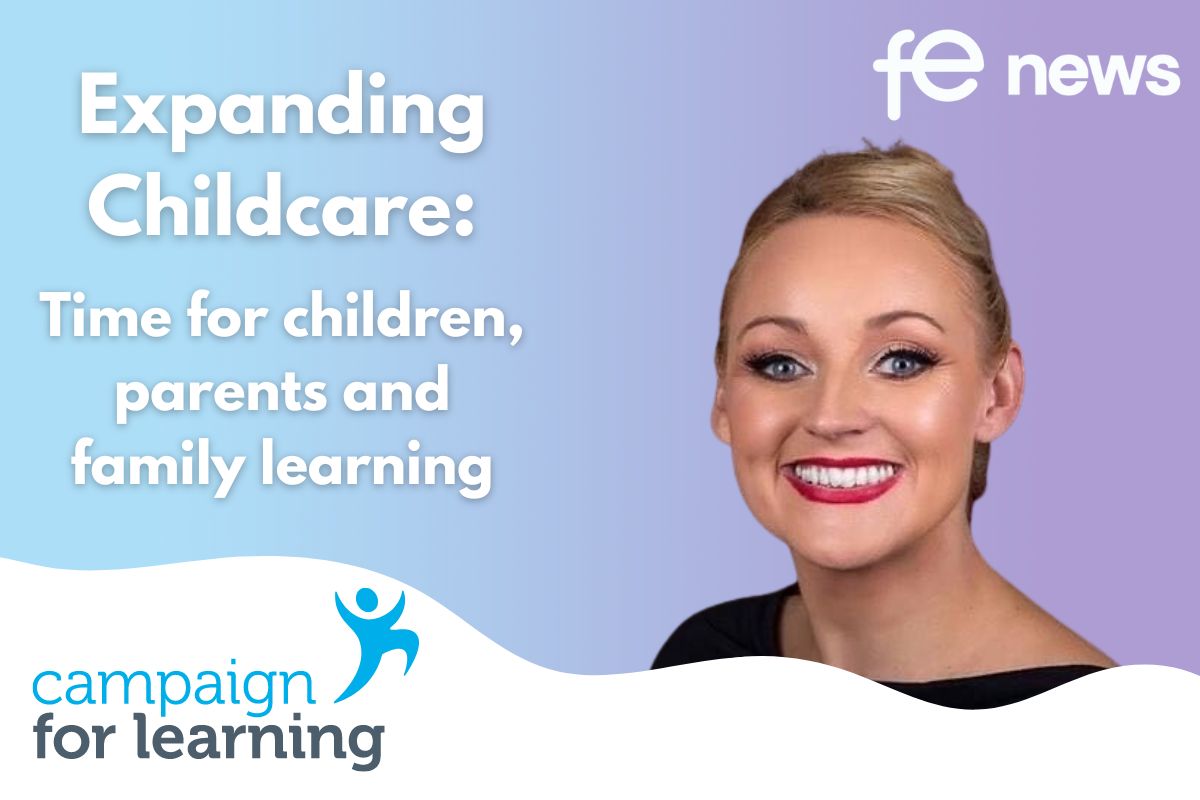Bringing childcare and family learning together

Expanding Childcare: Time for children, parents and family learning
Childcare is the beating heart of day-to-day life for many parents and carers that rely on it around the UK. In fact, the Childcare and Early Years Survey of Parents conducted by the UK Government’s Department for Education in August 2022 states that:
‘Overall, in 2021, 69% of families in England with children aged 0 to 14 had used some form of childcare during their most recent term-time week.’
The usage of childcare is said to have fallen since before the COVID-19 pandemic. This drop is being fuelled by the tandem forces of unavailability of childcare and its unaffordability amidst the cost-of-living crisis.
In spite of that change in the childcare landscape, however, it remains – in all its formal and informal settings as defined by the Department of Education in the aforementioned report – a lifeline for a significant proportion of families.
The childcare sector also remains powerful in its potential impact to support early learning outcomes and intergenerational learning in the wider educational landscape. The research literature shows the value of prioritising effort in early learning in childcare. The ‘State of the Nation: Understanding Public Attitudes to the Early Years’ report executive summary from the Royal Foundation of the Duke and Duchess of Cambridge states:
‘The first five years of childhood, are more pivotal for development, future health and happiness, than any other single moment in our lifetime.’
Combine that with the educational expertise in childcare settings and the immense power of family learning as a uniquely positioned high-impact low-cost intergenerational learning model and there is evidently untapped potential to unleash.
Family learning – activities where there are learning outcomes for both children and their parents/carers – has repeatedly been cited as a positively impactful model.
As far back as June 2014, the Deputy Director for Further Education and Skills at Ofsted, commenting on family learning best practice case studies – rather ironically, given the lack of emphasis placed on parental engagement in the inspection framework – stated that:
“… family learning can achieve great things and have a positive impact on the lives of children and young people. This can include improving their numeracy, literacy and language skills. Family learning schemes also play a critical role in aiding parents and carers to enjoy and understand better how to help their children in their learning.”
Susannah Chambers – Bringing childcare and family learning together
Blockers to family learning in childcare settings
Why then is family learning not a more prominent and widespread feature of parental engagement strategies in most childcare settings? There are two big blockers.
The first is competing priorities of parents and carers in their busy lives. Perhaps they are juggling the coordination of their parenting responsibilities with childcare setting timings and their working hours, which may not leave much spare time to engage in additional shared activities.
The second is, some might say, the draconian inspection regime of Ofsted that does not leave much time for childcare settings to invest in developing the skillset and partnerships needed to provide a high-quality, sustainable family learning offer.
The compliance dimension of the work of Ofsted and childcare settings may – in spite of the research evidence – project a lack of valuing parental engagement activity in a more substantive way than putting on the occasional fundraiser coffee morning or reviewing children’s work at parents’ evenings.
This is at their peril and clearly jeopardises children fulfilling their potential through the benefits of working intergenerationally with their parents/carers, which are withheld by an educational system not aligned to support family learning provision.
Scotland is leading the way
Scotland is the leading light policy-wise for proving through actions rather than words that parental engagement is valued and that family learning is a key vehicle for enabling children and their parents/carers to fulfil their potential. They made the commitment many years ago through their inspection regime framework to check family learning is provided in settings as mandatory provision and an entitlement for families in the early years.
Recommendation 1
DfE should make family learning a universal entitlement for all families with children aged 0-5. This will help ‘normalise’ accessing such provision for families who may face skills challenges themselves and build their confidence.
Recommendation 2
DfE should incorporate inspection of family learning provision into inspection frameworks for formal childcare settings such as nurseries. Making family learning a mandatory requirement for achieving a high grade of excellence in early years education provision will serve to elevate the value associated with parental engagement.
Recommendation 3
DfE should develop and provide a family learning toolkit for parents and carers, childcare settings and primary schools to develop family learning as a familiar practice for children, support transition to learning at school and sustain parental and carer engagement.
By Susannah Chambers, Independent Consultant
Campaign for Learning has released a new series of articles, Expanding Childcare: Time for children, parents and family learning.
See below when each article will be published on FE News:
Part One: Childcare the welfare state – 20th July
1. Will Snell, Chief Executive, The Fairness Foundation
Childcare and a new social contract
2. Anneka Dawson, Head of Pre-16 Education, Ceri Williams, Senior Research Fellow, and Alexandra Nancarrow, Research Fellow, Institute for Employment Studies
The childcare sector: Providers and the workforce in England
Part Two: Childcare and time for work – 21st July
3. Paul Bivand, Independent Policy Analyst
Women, employment and childcare
4. James Cockett, Labour Market Economist and Claire McCartney, Policy Adviser, Resourcing and Inclusion, CIPD
The planned childcare entitlements and progression into work
5. Jane van Zyl, Chief Executive, Working Families
Combining flexible working and childcare to solve the childcare crisis
Part Three: Childcare and time for child development – 24th July
6. Janeen Hayat, Director of Collective Action, Fair Education Alliance
Improving childcare quality to support educational outcomes
7. Megan Jarvie, Head of Coram Family and Childcare
Making a step change to child development through childcare
8. Professor Elizabeth Rapa and Professor Louise Dalton, University of Oxford
Childcare, children’s development and education outcomes
Part Four: Childcare and time for parental engagement – 25th July
9. Lee Elliot Major, Professor of Social Mobility, University of Exeter
The childcare revolution: A new opportunity for parental partnerships in child learning
10. Bea Stevenson, Head of Education, Family Links the Centre for Emotional Health
Childcare and parental engagement in child learning
Part Five: Childcare and time for adult skills – 26th July
11. Simon Ashworth, Policy Director, AELP
The new childcare entitlements and skills bootcamps
12. Sharon Cousins, Vice Principal, Newham College and National Association for Managers of Student Services Executive
The new childcare entitlements and access to further education
13. Susan Pember, Policy Director, HOLEX
A thriving society means linking the new childcare entitlements to adult learning
Part Six: Childcare and time for family learning –
27th July
14. Sam Freedman, Senior Fellow, Institute for Government
The childcare revolution and family learning
15. Susan Doherty, Development Officer – Family Learning, Education Scotland
Family learning and childcare: Lessons from Scotland
28th July
16. Susannah Chambers, Independent Consultant
Bringing childcare and family learning together
17. Henriett Toth, Parent
Family learning and childcare: A personal experience











Responses